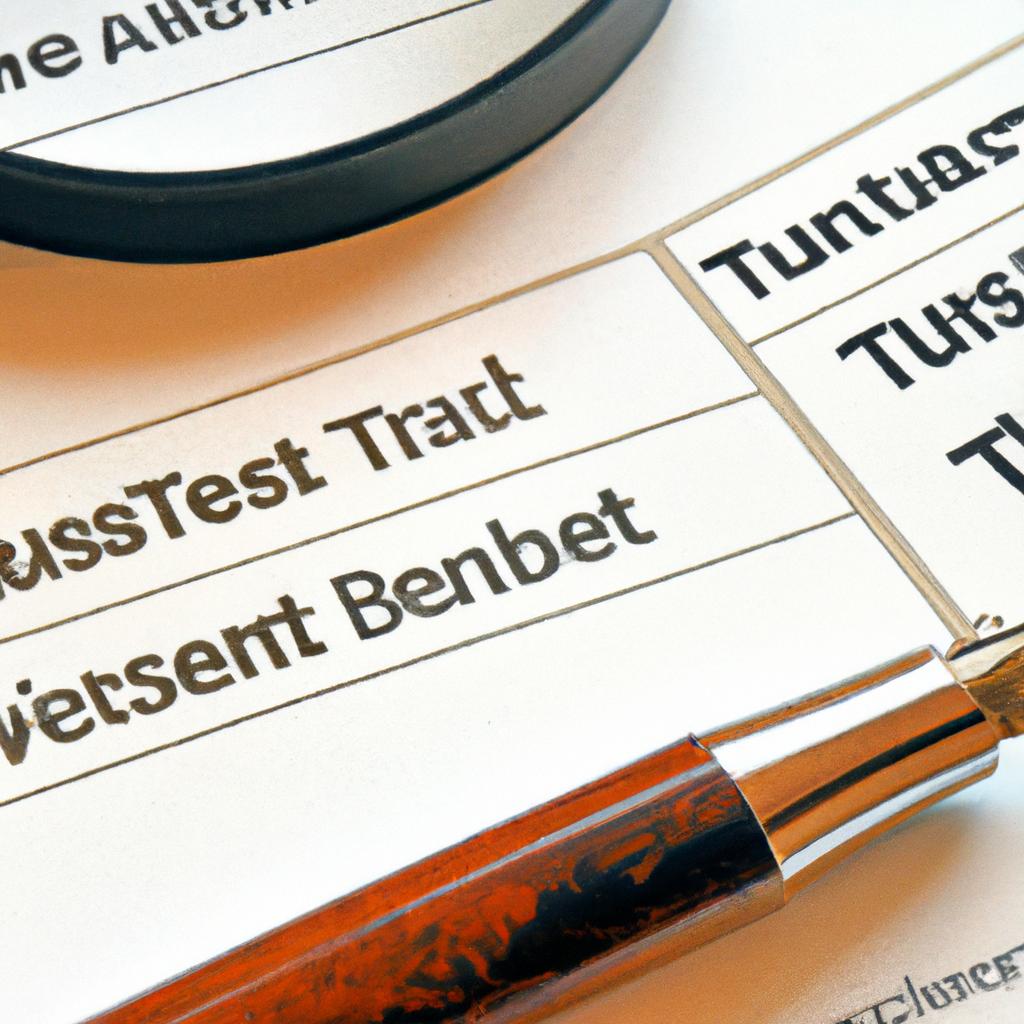In the intricate world of estate planning and asset protection, the establishment of a trust bank account stands as a cornerstone of financial security and peace of mind. As experienced legal practitioners at the esteemed Morgan Legal Group, located in the heart of bustling New York City, we understand the importance of safeguarding one’s assets through meticulous planning and strategic trust formation. In this article, we will delve into the essential components of setting up a trust bank account, demystifying the process and providing valuable insights for individuals seeking to secure their financial future. Join us as we navigate the intricate path towards a more secure and prosperous tomorrow.
Setting up a Trust Bank Account: Understanding the Basics
When setting up a trust bank account, it is important to understand the basics to ensure a smooth process and optimal management of trust funds. Trust bank accounts are specifically designed to hold assets for the benefit of beneficiaries designated in a trust agreement. These accounts offer a secure and efficient way to manage funds and administer the trust according to the grantor’s wishes.
**Key considerations when setting up a trust bank account include:**
- Choosing the right type of trust account based on the trust’s purpose
– Selecting a reputable financial institution with experience in trust administration
– Providing proper documentation, such as the trust agreement and identification for all trustees and beneficiaries

Key Considerations for Selecting a Trustee for Your Trust Bank Account
When selecting a trustee for your trust bank account, there are several key considerations to keep in mind. Trustees play a crucial role in managing the trust assets and ensuring that the terms of the trust are carried out according to your wishes. Here are some important factors to consider when choosing a trustee:
- Trustworthiness: It is essential to choose someone who is honest, reliable, and has a track record of financial responsibility.
- Financial acumen: The trustee should have a good understanding of financial matters and be able to make sound investment decisions on behalf of the trust.
- Availability: Make sure the trustee has the time and availability to manage the trust effectively and respond to any issues that may arise.
Furthermore, it is important to consider the relationship dynamics of potential trustees with beneficiaries to avoid conflicts of interest. Additionally, consider naming a successor trustee in case the primary trustee is unable to fulfill their duties.
| Key Considerations | Details |
|---|---|
| Trustworthiness | Choose someone honest and reliable. |
| Financial acumen | Ensure the trustee can make sound financial decisions. |
| Availability | Confirm the trustee has time to manage the trust effectively. |

Establishing Clear Terms and Conditions for Your Trust Bank Account
Establishing a trust bank account is a crucial step in ensuring the protection and management of your assets. By clearly defining the terms and conditions of your trust account, you can safeguard your financial interests and ensure that your funds are handled in accordance with your wishes. The first step in setting up a trust bank account is to carefully review and understand the terms and conditions set forth by the bank. This includes familiarizing yourself with any fees, interest rates, and withdrawal limits that may apply.
When , it is important to consider the following key components:
- Designating Trustee: Clearly identify the trustee who will be responsible for managing the account and making financial decisions on behalf of the trust.
- Access and Control: Define who has access to the account and under what circumstances funds may be withdrawn or transferred.
- Investment Strategy: Outline the investment goals and strategies for the trust funds, including any restrictions or guidelines for investment decisions.
- Reporting Requirements: Establish how often the trustee must provide account statements and financial reports to trust beneficiaries.
- Conflict Resolution: Include provisions for resolving any disputes or conflicts that may arise regarding the trust account.
By carefully documenting and adhering to these terms and conditions, you can protect your assets and ensure that your trust bank account operates smoothly and effectively.
Navigating Legal and Tax Implications of Funding a Trust Bank Account
When it comes to setting up a trust bank account, there are several important legal and tax implications to consider. Properly navigating these implications is crucial to ensuring the trust is properly funded and managed. Here are some key factors to keep in mind:
- **Legal Considerations:** Before funding a trust bank account, it is important to consult with an experienced attorney to ensure that all legal requirements are met. This includes properly drafting a trust agreement, designating a trustee, and clearly outlining the beneficiaries and terms of the trust.
- **Tax Implications:** Funding a trust bank account can have significant tax implications, both for the grantor and the beneficiaries. It is important to understand the tax consequences of transferring assets into a trust, as well as any ongoing tax obligations that may arise. Consulting with a tax professional can help minimize tax liabilities and ensure compliance with all applicable tax laws.
Q&A
Q: What is a trust bank account?
A: A trust bank account is a specialized account set up to hold assets on behalf of a beneficiary, managed by a trustee.
Q: Why would someone set up a trust bank account?
A: Trust bank accounts are commonly used for estate planning, managing assets for minors or individuals with disabilities, or ensuring the smooth transfer of assets to beneficiaries after the account holder passes away.
Q: How do you set up a trust bank account?
A: To set up a trust bank account, you would need to select a trustee, establish the terms of the trust, and then open a bank account in the name of the trust.
Q: Can anyone be a trustee for a trust bank account?
A: While technically anyone can be named a trustee, it is important to choose someone who is trustworthy, financially responsible, and capable of managing the assets according to the terms of the trust.
Q: What are the advantages of setting up a trust bank account?
A: Setting up a trust bank account can help protect assets, avoid probate, provide for the care of vulnerable beneficiaries, and ensure that assets are distributed according to the account holder’s wishes.
Q: Are there any downsides to setting up a trust bank account?
A: Some potential downsides of setting up a trust bank account include the costs associated with establishing and maintaining the trust, the loss of some control over the assets, and the potential for conflicts among beneficiaries or trustees.
Q: Can a trust bank account be changed or revoked?
A: Trust bank accounts can typically be amended, revoked, or dissolved by the account holder while they are still alive, as long as they are mentally competent to do so, and the terms of the trust allow for such changes.
Future Outlook
In conclusion, setting up a trust bank account can provide security and protection for your assets and loved ones. With careful planning and consideration, you can ensure that your wishes are carried out exactly as you intended. Trust bank accounts offer a sense of peace of mind and a way to leave a lasting legacy for future generations. So why not take the first step towards securing your financial future today? Trust us, it will be worth it in the long run.





